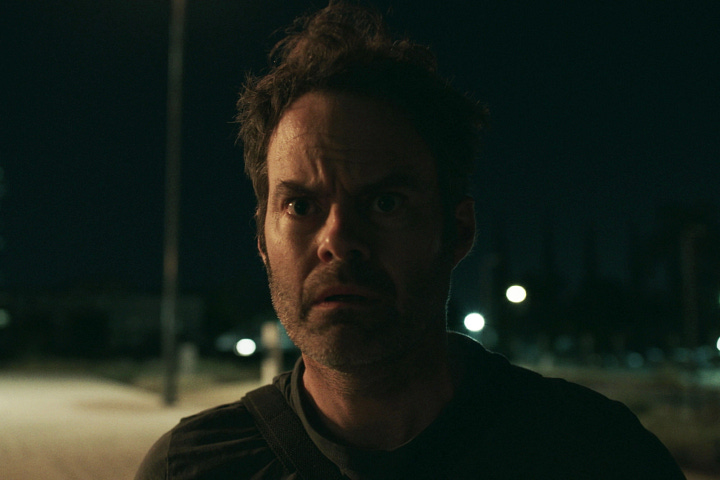The Mirror Images of Masculinity in the 'Barry' and 'Ted Lasso' Finales
Is change possible? And could psychedelics help?


Spoilers ahead for the Barry and Ted Lasso finales.
Last week, Ted Lasso signed off from his radically, almost aggressively, optimistic television journey by boarding a plane back home to Kansas. In what was likely, but not officially, the AppleTV+ sensation’s final episode, its main character, who rebelled against the antiheroes who have reigned over prestige TV the last two decades by helping others see the best in themselves, resigned from his job coaching a UK soccer team. As he traveled back to the states, he pointedly opened a book on his flight: Michael Pollan’s How to Change Your Mind.
Ted’s ending stood in stark contrast to that of his spiritual TV brother Barry Berkman, the deeply troubled title character of HBO’s pitch-dark comedy (slash tragedy?), Barry. Barry, having brought out the monstrous worst in everyone around him, went out in a cut to black, shot dead by the man he’d obsessively and neurotically tried to turn into the father figure he wanted. No Sopranos-like ambiguity here; Barry is a goner.
Not only are these two characters inverses of each other, positive and negative masculinity reflecting off of each other. They’re also both the surprising creations of men who made their names on Saturday Night Live together for the exact same span, 2005 to 2013. Both Jason Sudeikis (Ted Lasso) and Bill Hader (Barry) worked with seasoned showrunners to make what appeared to be not just TV series but true expressions of their souls. Neither show was perfect, but both had moments of brilliance. Barry built to an absolutely stunning finale, while Ted Lasso leaned into its more saccharine tendencies in the end. But ultimately both shows were about whether people can change, and they came to exactly opposite, though perhaps not opposed, conclusions: Ted Lasso told us that the way people change is by opening up to help from others; Barry told us that change is impossible if you have the wrong people around you.
What does any of this have to do with psychedelics? The clue is in the title of Pollan’s book, the work largely responsible for taking psychedelics mainstream in recent years. Those who use psychedelics consciously are looking to change their minds, change themselves. When I did a piece on modern American shamanism seven years ago, I heard this over and over again, that people who practiced plant medicine—taking mushrooms or ayahuasca with intention—often came home from their first experience and radically changed their lives, ending marriages, quitting jobs, moving across the country. In Pollan’s book and the Netflix documentary series of the same name, you learn the stories of people who have drastically curbed their OCD and PTSD. Since Lasso and Barry both explore the philosophy of change, their ideas can help us to think about the change we seek in our own lives. Ted Lasso dealt explicitly with psychedelics, as I wrote about here a few weeks ago, and Barry did not. But I did find myself wishing the characters in Barry had some mushrooms handy. They could have used some, for sure.
Lasso, the story of an earnest Midwestern football coach who ends up managing a British soccer team, grew out of a character Sudeikis created for a promo for NBC Sports’ coverage of England’s Premiere League. But it’s always been higher-minded than its commercial origins suggested, which makes sense given that the idea actually started with a psychedelic trip Sudeikis took in Amsterdam. Ted’s reading material hinted at a spiritually tinged journey from the beginning; on the plane to the UK in the first episode, Ted read Jack Kerouac’s The Dharma Bums, which is loosely based on the author’s own exploration of Buddhism. Ted embodies Buddhist ideals like empathy, true expression, and, critically, interdependence. The literal bookending of The Dharma Bums and How to Change Your Mind points to what the show wants us to know about Ted. In fact, the finale may have been a bit too explicit about the series’ intentions in the end, even having one of its characters state the thesis out loud: “The best we can do is keep asking for help and accepting it when you can. And if you keep on doing that, you’ll always be moving towards better.” At its best moments, in its second season as it dealt with Ted’s anxiety and the loss of his father to suicide, Ted Lasso was subtler and more interesting. But over its three seasons, it has brought a sweetness and optimism to television that we needed, ultimately giving us, as my friend Erin Carlson recently wrote, a “fool triumphant” story.
On Barry, however, there is no triumph, even though it’s interested in the same fundamental question about change. It wasn’t clear from the beginning whether Barry was a comedy or a tragedy. The premise read as darkly funny: a traumatized combat veteran-turned-hit man discovers an acting class in Los Angeles and hopes to transmute his pain into art for a shot at redemption. Much of the series, particularly early on, skewers the self-seriousness of Hollywood, contrasting actors’ melodrama with the real stakes of mob warfare that Barry and his handler are caught up in. It was always very funny, down to the last dark moments. (The comedic genius of Anthony Carrigan as Chechen mobster NoHo Hank cannot be overstated.)
But as Barry’s excellent final season unfolds, a creeping sense of dread kicks in: We slowly realize these people are not going to change for the better. Barry and his girlfriend, Sally, have gone into hiding and had a young son; Barry’s father figure/acting teacher Gene Cousineau has retreated to an Israeli kibbutz; and Barry’s frenemy NoHo Hank has gone legit with a major real estate business. They’re all undone by a mere showbiz announcement: a biopic about Barry is in the works. As Barry and Gene return to Los Angeles under the guise of stopping the project, the characters end up back in their old entangled ways. Barry can’t stop rationalizing his urge to kill, despite having recently found God. He listens to a succession of religious podcasts on the subject of whether murder is a sin, clearly hoping to find one that justifies his renewed resolve to kill Gene. Gene, meanwhile, can’t stop seeking the spotlight. (Daniel Day-Lewis wants to play him!) It’s clear that no one has changed, no one really wants to change, and they are all made worse by their proximity to each other.
Barry is the catalyst, bringing out all of the characters’ worst tendencies and ushering them toward a terrible end. His problems, it’s important to note, stem from his time as a U.S. Marine serving in Afghanistan. His PTSD is his undoing and has catastrophic ripple effects. The series’ devastating conclusion comes in the form of scenes from the schlocky biopic that ends up glorifying Barry, posthumously, as a hero and condemning Cousineau, who’s gone to prison for shooting him, as a villain. We want to glorify men like Barry in cheap ways that make us feel good and safe, the show says, but we don’t want to do the work to help them in real ways.
And this actually has quite a bit to do with psychedelics. My joke that I wished Barry had access to some ‘shrooms wasn’t really a joke at all. Psychedelic therapy has shown great promise for veterans with PTSD, and is currently being studied more closely by the Veterans Administration. People like Barry need more help like this, instead of false platitudes making them into cardboard heroes.
Specifically, what hallucinogens can do, if administered correctly, is to quite literally “create lasting personality change,” according to a 2011 study at Johns Hopkins University. Researchers found that participants emerged from the experience with more “openness,” a change that was measurable and lasted for at least a year. Normally, people don’t tend to change much after the age of 30, according to the scientists who designed the study. But these participants had expanded “traits related to imagination, aesthetics, feelings, abstract ideas and general broad-mindedness.”
That sounds an awful lot like an antidote to toxic masculinity. Those are all traits Ted Lasso could get behind—and could have saved Barry in the end.




I am howling. The statue. Sally. YES! FYI-I identify much more with Barry than TL. Blessings to the sweethearts but Gene Cousineau is *my* soccer coach.
I am *still* unpacking Barry (big fan) and this helped me so much. Brilliant.